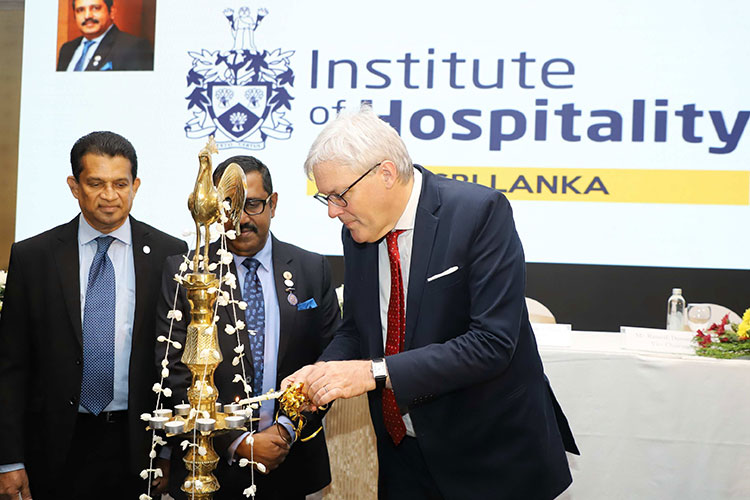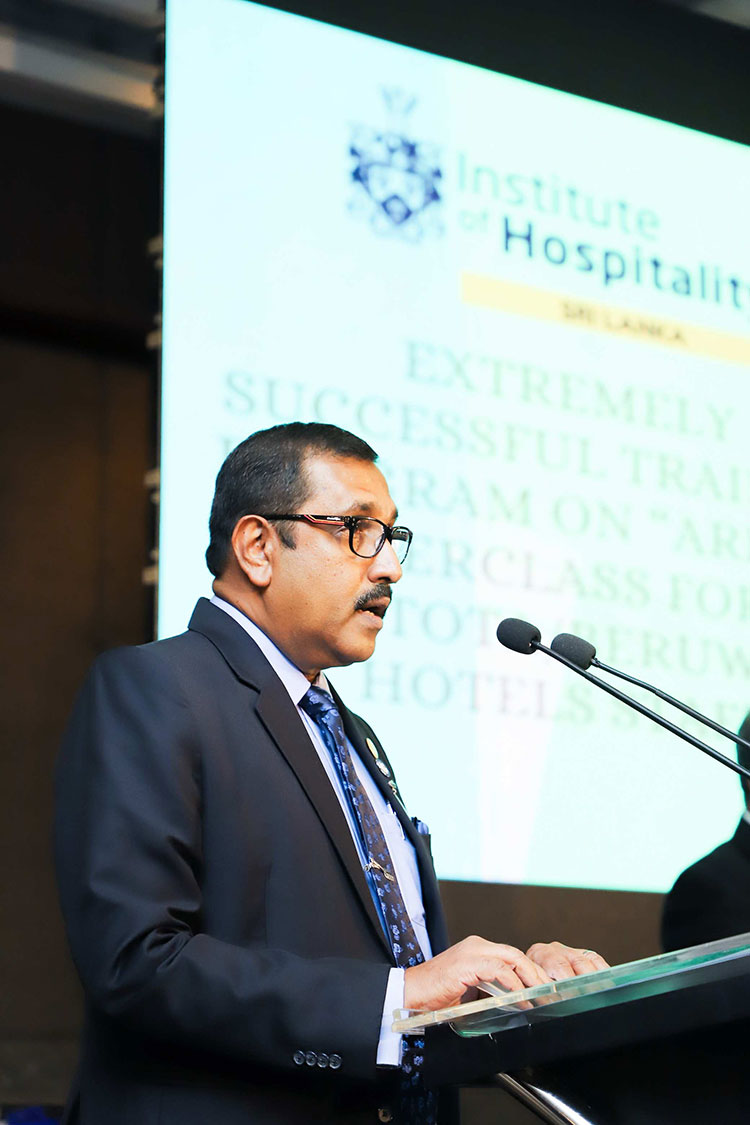Life style
From ‘nobody’s child’ to somebody’s child
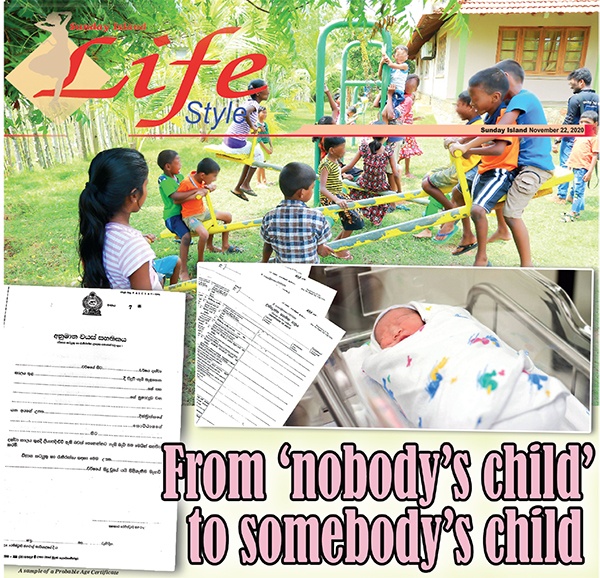
‘The Probable Age Certificate’ (PAC) issued to children without a birth certificate for lack of key information required for its issue often means discrimination and social stigma despite the PAC’s legal validity. In a bid to renew discussion on this social dilemma and find more socially acceptable alternatives at policy-making level, we spoke to multiple stakeholders including those who had left care homes and have been at the receiving end of the consequences.
by Randima Attygalle
Dhanushka Kumara Jayaratne was rejected by several leading schools when seeking Grade One admission on the grounds of his holding a ‘Probable Age Certificate’ as opposed to a Birth Certificate. When he was finally admitted to a school, he was shut out of cultural events and sport competitions at various levels on the basis that he had no ‘proper birth certificate’. When applying for his national identity card and travel visas on several occasions, bottlenecks were many. One of the main problems was that the probable age certificate (PAC) did not specify any guardian in the absence of names of parents.
 Today a 31-year-old executive, Dhanushka gives leadership to the ‘Generation Never Give up Network’ (GNGN), an initiative of the SOS Children’s Villages, Sri Lanka which advocates the causes of care leavers (children leaving child care institutions at 18 years). Lobbying for a more socially acceptable form of a birth certificate in place of the PAC is one of the top priorities of this collective.
Today a 31-year-old executive, Dhanushka gives leadership to the ‘Generation Never Give up Network’ (GNGN), an initiative of the SOS Children’s Villages, Sri Lanka which advocates the causes of care leavers (children leaving child care institutions at 18 years). Lobbying for a more socially acceptable form of a birth certificate in place of the PAC is one of the top priorities of this collective.
“PAC often leads to discrimination and stigmatization due to its format,” observes this young man pushing for a more ‘dignified’ birth certificate with ‘better terminology’ and provisions for ‘guardians’ that could either be an individual or a child care institute. “The issue was taken up by the Parliamentary Sectoral Oversight Committee on Women and Children a couple of years ago and was discussed for a while but unfortunately no solution was tabled,” notes Danushka who hopes to renew the dialogue among relevant partners through the GNGN initiative.
“The probable age certificate of mine is nothing but a piece of paper with some dotted lines claiming that I was born within such a time frame. It is very humiliating to produce this piece of paper for government exams, employment etc,” says Nirmala Niroshini. Recollecting the emotionally traumatizing moments when she was viewed almost as an ‘abnormal’ individual on the basis of her PAC, Nirmala urges the authorities to revise its present format and enable a more acceptable document. She also proposes that an endorsement on the PAC by the Registrar General’s Department to make it as good as a normal birth certificate for official purposes. “It was an uphill task for me to get my NIC. I had to submit so many supporting documents verifying the legality of my PAC to convince the authorities. Finding employment was another battle,” says Nirmala, who is today employed as a clerical staffer at a dental clinic.
Current regulations
The Registrar General’s Department makes provisions to obtain a PAC for children who are in homes approved by the government, children who are not in such homes and even adults. Statistics on the exact number of children presently holding PACs in the country however remain unclear.
The PAC is issued to individuals (children as well as adults) who cannot be granted a ‘birth certificate’ due to lack of key information required for the latter. “This includes the absence of an exact date of birth or even the mother’s name. To issue a birth certificate, an informant is required and if the informant (who is often an authority from a child care institute in case of children under 14 years) cannot furnish the information required, providing a birth certificate would become difficult,” admits the Senior Deputy Registrar General G.A.L.D. Ganepola.
The Establishment Code and the Public Administration Circular 26/1995 provide for the acceptance of the PAC. The Public Administration Circular 26/1995 states that PAC ‘is acceptable for the purpose of confirmation of name and date of birth of persons.’
“Probable age certificate is a legitimate legal document which should be accepted by all agencies although in reality it doesn’t happen largely due to ignorance of the regulations,” notes Ganepola. Increased public awareness on this matter with wide media coverage is necessary for this, says the official. A unique ID number at birth is another alternative proposed by the Senior Deputy Registrar General which could be used for all administrative purposes including school admission, admission into children’s homes etc.
Social stigma
Despite the law recognizing all individuals to be treated equally regardless of any complications pertaining to their birth, children with the PAC are discriminated and stigmatized from all directions in society when they sit for government exams, apply for jobs, universitiy admission, competitive sports and government benefits, says Divakar Ratnadurai, National Director, SOS Children’s Villages Sri Lanka.
Out of 900 children currently living in SOS villages, around 300 have PACs. Also, many who have left the homes are similarly burdened. Lobbying for the reintroduction of the Extract (a shorter version of the birth certificate) with certain modifications enabling practical options where the required information is not available is a possible solution says Ratnadurai. This Extract which was once available was discontinued in the 1970s.
Constraints in obtaining basic information of destitute children is another bottleneck which has led to certain children receiving the PAC instead of a birth certificate, he points out. “Sometimes children are enrolled in care homes without basic information and care givers are faced with difficulties searching for this information.”
Ratnadurai proposes several measures to raise awareness among multiple stakeholders including school authorities to eliminate discrimination. Establishing a special unit in the Department of Probation and Child Care Services to provide continuous awareness on the PAC; lobbying policy makers and administrators for the ‘Extract’ to be given legal recognition etc. are among the correctional proposals made to make life easier for those carrying this burden.
Sensitizing stakeholders
Proposing a probable ‘birth’ certificate replacing the present probable age certificate, Commissioner, Department of Probation and Child Care Services, Chandima Sigera calls for sensitizing the stakeholders at every level including education authorities, other government officials, private sector and the community at large on this issue. In the best interest of children moving for a more socially acceptable form of identity which wouild eliminate dicrimination is urgent says the Commissioner who alludes to the fundamental rights of ‘non discrimination’ and and ‘best interest’ of children upheld in the United Nations Convention on the Rights of the Child.
Determining the age of a child
The current regulations require for a medical certificate estimating the age of the child (probable age) to be submitted to the Registrar General’s Department to obtain a probable age certificate. This is issued by a JMO who collaborates with other specialists.
“In estimating the age of a child, factors such as development of teeth and bones are taken into account. If there is any other medical evidence such as a diagnosis card, we take it into consideration as well,” explains the Consultant JMO, Dr. Uthpala Attygalle. Once the probable time frame of birth is established, the applicant’s date of birth is recorded either as January 1 or July 1, depending on each case.
A vicious cycle
Care leavers sadly become victims of a vicious cycle points out Prabodhini Munasinghe Wickrematunga, Attorney-at-Law with special interest in gender issues. “When women are unable to care for them, children are abandoned. Often the mother is unable to reveal the identity of the father because the pregnancy is a result of rape, sometimes by a relative.
Most employers know nothing about PACs making it difficult for their holders to find decent work and sometimes out of sheer desperation are driven to prostitution. This vulnerability exposes them to risks both in terms of health and security.
Uncertain identity arising as a result of not having a birth certificate which is regarded as an essential document can lead to many negative emotions, explains Dr. Neil Fernando, Consultant Psychiatrist and Senior Lecturer from the Kotelawala Defence University. “Uncertainty frequently brings with it unpredictability which reduces the mental well being and frequently acts as a stress factor. Long term stress is a predisposing factor in causing many non-communicable diseases which include heart disease and diabetes,” he said. Feelings of alienation from the community can lead to social isolation and depression, he added.
Life style
Camaraderie,reflection and achievements

Institute of Hospitality Sri Lanka
 The 32nd Annual General Meeting (AGM) of the UK-based Institute of Hospitality’s Sri Lanka Chapter was held recently at the Ramada Hotel Colombo,.The event provided an evening of camaraderie , reflection of the past and present achievements,setting new benchmarks for the future
The 32nd Annual General Meeting (AGM) of the UK-based Institute of Hospitality’s Sri Lanka Chapter was held recently at the Ramada Hotel Colombo,.The event provided an evening of camaraderie , reflection of the past and present achievements,setting new benchmarks for the future
The AGM had the presence of two distinguished guests, the Chief Guest Opposition Leader Sajith Premadasa, and the Guest of Honour British High Commissioner to Sri Lanka, Andrew Patrick. Their inspiring speeches were lauded by all hoteliers who were present at the occasion
A special thanks was extended to Robert Richardson, CEO of the Institute of Hospitality UK, along with his team, sponsors, committee members, and all attendees for making the event memorable.
Dr. Harsha Jayasingh, Past President of the Institute of Hospitality (UK) Sri Lanka Chapter, emphasised the Institute’s longstanding history and the strength of its Sri Lankan branch. “The Institute of Hospitality (IH) UK has a history of 86 years, and we are proud to be the Sri Lanka Branch. IH Sri Lanka is much stronger now with many members from all areas of the hospitality industry,” he stated.
Dr. Jayasingh highlighted the significant role of tourism in Sri Lanka’s economy,. He said tourism it is the third-largest source of revenue for the country. “Tourism accounts for about 13.3% of total foreign exchange earnings and employs 450,000 people directly and indirectly. The hospitality industry in this island of pearl holds tremendous potential for economic growth, job creations, and cultural exchange,” he added.
He also pointed out more women should be attracted to the industry and advocated for the use of technology in hospitality sector to attract the younger generation.
The newly appointed Chairman Ramesh Dassanayake spoke about the challenges faced by the industry, including the reluctance of youth to join the sector. . Dassanayake expressed concerns over the migration of staff between hotels and the overall ‘brain drain’ in the sector. ” We must maintain high standards in the hotel We must try to attract tourists to Sri Lanka, we must have with many facilities Hence, hotel schools and other professional institutions involved in skills development mustincrease their intakes,” he pointed out.
Chief Guest Sajith Premadasa emphasised the importance of eco tourism and said “We need to have an environmental policy related to tourism in place,” . .
The 32nd AGM of the Institute of Hospitality UK, Sri Lanka Chapter, was a testament to the strength and potential of Sri Lanka’s hospitality industry. The insights and commitments shared during the event set a new benchmark for the future.(ZC)
Pix by Thushara Attapathu
Life style
He recognizes human identity beyond boundaries of gender, race, nationality and religion.
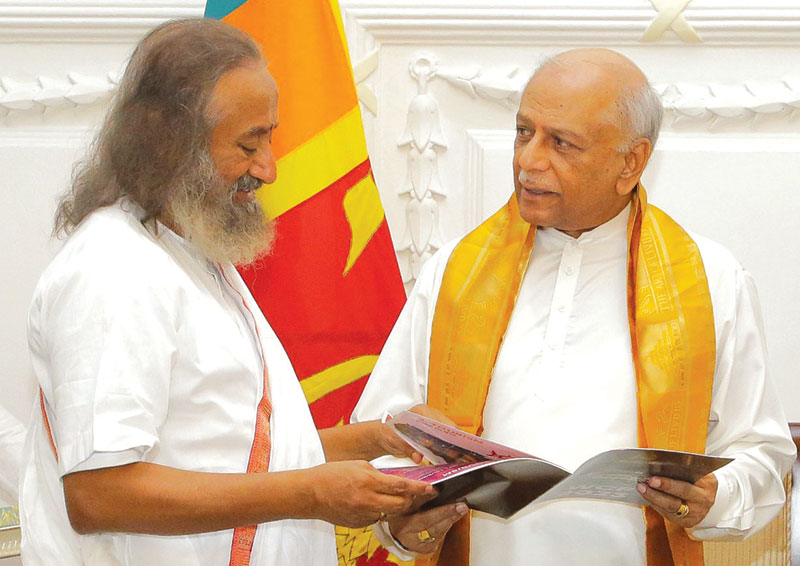
Visit of Sri Gurudev to Sri Lanka
Humanitarian, spiritual leader and Global Ambassador of Peace Gurudev Sri Sri Ravi Shankar (Sri Gurudev) was in Sri Lanka on a three day tour on the invitation of the Prime Minister of Sri Lanka Dinesh Gunewardene. Gurudev who inspired a wave of volunteerism and service to moot one of the largest volunteer-based organisations in the world – The Art of Living – visited the various projects under the aegis of the foundation and launched twelve vocational and technical centers around the island. He was accompanied by thousands of followers from Sri Lanka and around the world.
Gurudev who visited Sri Lanka for the sixth time also had a first day cover launched in honour of his visit. He is a strong proponent of spreading happiness, using the unique Sudarshan Kriya, yoga, meditation and practical wisdom to unite people, empower individuals and transform communities. His programmes provide techniques and tools to live a deeper, more joyous life, while his non-profit organisations recognize the human identity beyond the boundaries of gender, race, nationality and religion.
The Art of Living which has more than 30,000 teachers and over one million volunteers across 180 countries has touched in excess of five hundred million people around the world. CNN called it “Life Changing” and The Washington Post headlined it, “Fresh air to millions”.
In Trincomalee, Gurudev met with war victims and had a heartwarming engagement with the children from the children’s homes run by the Foundation. He also visited the Koneswara Temple in Trincomalee and graced the Kumbhabhishekam at Seetha ecogPnize the human identity beyond the boundaries of gender, race, nationality and religion. Amman temple at Nuwara Eliya. He held discussions with the trustees on the progress of the foundation’s social service projects, while also holding a special event – Ekamuthuwa – attended by a large number of dignitaries and his devotees from around the world.
His time with the Prime Minister was spent discussing the prospects of unity in diversity and uniting Sri Lanka by adding happiness into the formula of living. In addition he had discussions with the Speaker of the Parliament of Sri Lanka Mahinda Yapa Abeywardena, prominent business stewards and civil society leaders.
Life style
Bridal shows with opulence and luxury at The Epitome hotel in Kurunegala
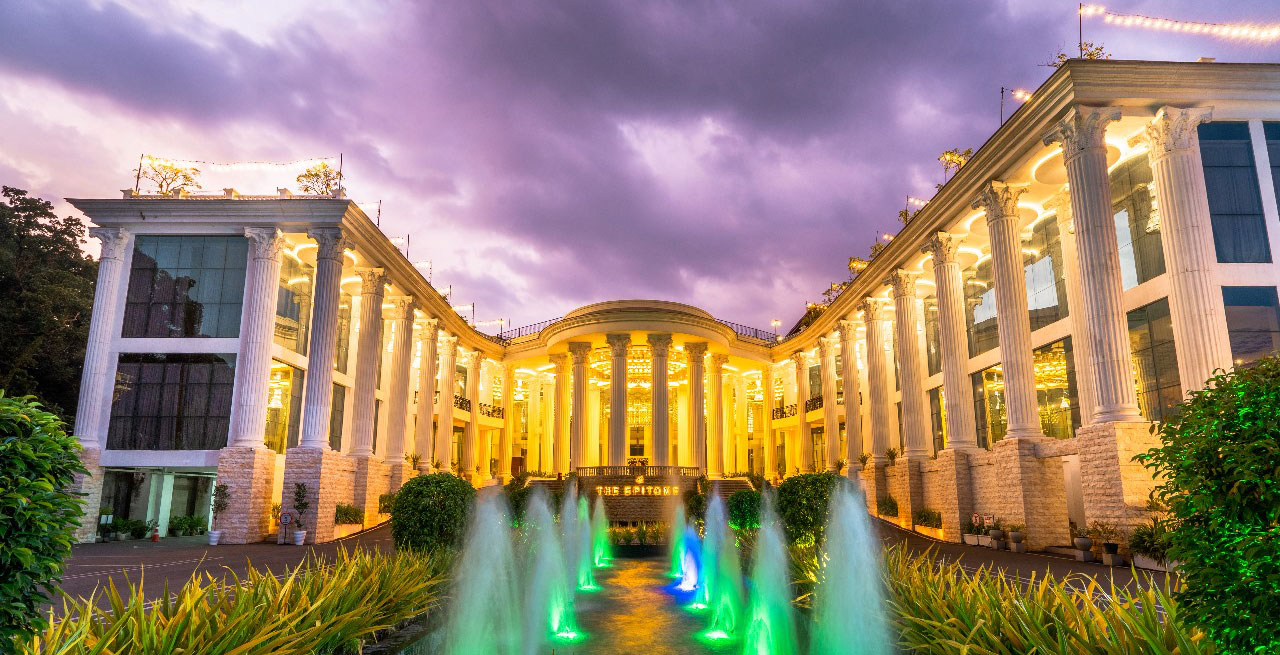
by Zanita Careem
Envison your dream wedding day come to life at the Epitome Hotel, a prestigious city hotel in Kurunegala offering an unrivalled luxury rendors experience for weddings.
The venue is designed to embody opulence and luxury from all quarters for a spectacular wedding in kurunegala,Thier ballroom is the largest banquet facility in Sri Lanka It can be divided into six luxurious pillarless wedding halls on the ground floor and 25pax smaller banquet halls.
It can be easily named as a five star heaven in the heart of the city contributing to a myriad of immense experiences tailored to inspire and delight wedding experiences.
From opulent décor set up to exquisite table decor, lavish food, every detail is meticulously curated to spark your imagination and ignite creativity for a perfect wedding. The previous prestigious wedding shows season one and season two attracted large crowds
were unique events which gave the wedding vendors and potential clients had an opportunity to connect and interact with each other. Beyond being a showcase it was a chance for the wedding vendors to unite and contribute to the vibrancy of the wedding industry. The wedding show covered all area of the bridal industry providing a comprehensive variety of bridal supplies from Sri lanka and became the most popular bridal exhibitions in Kurunegala.This bridal exhibitions allowed brides and grooms to experience first hand the products and services available from suppliers in Sri Lanka
These wedding shows held at The Epitome created a benchmark and gave an opportunity for vendors to create connections to the utmost satisfaction said Harshan Lakshita Executive Director. of the magnificent Hotel
Our wedding shows featured experts and professionals in every field‘ It covered all areas of the bridal industry provided a comprehensive variety of bridal supplies from Sri lanka and became most popular bridal exhibition in this region.We are always open to everyone to join us at our wedding shows in the future. It is an opportunity to discover the incredible talent within our local wedding and bridal vendors to make meaningful relationships and plan thier special day at our breathtaking hotel The Epitome said General Manager Kavinda Caldera
The Epitome Hotel’s bridal show which will be held end of June will buzz with great ideas,advice and inspiration for all those who plan thier dream wedding
…….
The Hotel Epitome’s Wedding Season 3 will marked excellence, celebration and inspiration for those in the wedding industry. The exhibition halls will resonate with ideas on exquisite bridal wear to decor, florists , photography etc and showshowcase the rich tapestry of talent within the local wedding industry. .




